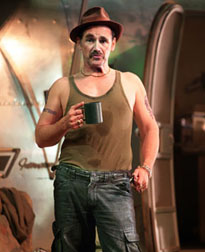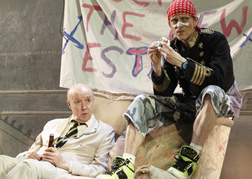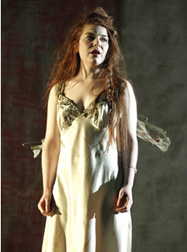
By Lucy Komisar
I hated this play by English playwright and film director Jez Butterworth. Yes I know it got plaudits and awards, but I thought it was pretentious drivel. The friend I took also hated it. Lest you think that was just an off night, her friend who attended at another time hated it. Nevertheless it was so powerfully acted by Mark Rylance and so vividly directed by Ian Rickson that we were annoyed and even angry, but never bored.
Johnny Rooster Byron, brilliantly performed by Rylance, is a moral and physical wreck. He limps. That is because he was a dare-devil motorcycle rider who bike-jumped over lines of buses. He didn’t always make it. Now he makes a living by painting houses.
He is gross and crude. He is self-destructive. He is a drunk barred from every bar in town. He tells tall stories. One is about a 90-foot giant Druid. Or was it 100-feet tall? Perhaps it changes with the telling. Hmm, is this egregious failure also larger than life?
He lives in the woods of Flintock, Wiltshire, South West England. We are introduced to his home with screaming loud music and a light flashing outside a silver trailer appropriately called Waterloo. (He will meet his.) The yard is furnished with an old loveseat, a metal Coca-Cola sign, tires, dilapidated chairs, and a John Deere tractor. (The set is by Ultz.) He has lived there for 29 years.
Rooster is the leader of the Flintock rebellion. His followers are a group of educationally subnormal outcasts, drunk teenagers such as the bland, fat Davey (Danny Kirrane); the fat Tanja (Charlotte Mills) – is being fat a cause or result of their not fitting in? – and Lee (John Gallagher Jr), who says he is chucking it all and going to Australia. Rooster provides them with ample supplies of drugs and alcohol. He also gets visits from a retired poetry-spouting professor (Alan David) who always arrives in a beige suit and tie and finds in Rooster an audience.

The rebellion is targeted at local government officials who want to serve Rooster an eviction notice so they can build estate (public) housing on land he is squatting. A sign on a white sheet declares Fuck the new estate.
Now we get to Jerusalem, which is supposed to be a metaphor for heaven on earth where people live in peace and in connection with the land. The notion dates to an early 19th-century verse by poet William Blake which challenged the encroachment of the industrial revolution with the promise: I will not cease from Mental Fight/ Nor shall my sword sleep in my hand/ Till we have built Jerusalem/ In England’s green and pleasant land. It was put to music in England during WWI and became a popular hymn.
Are we supposed to believe that Rooster and his mostly dysfunctional hangers-on are bucolic creatures fighting the harsh incursions of the people in power who want to despoil their green and pleasant idyll? Remember that the new estate is not for high-priced mansions for the rich, but for houses for the working class.
Continuing the metaphor, this is the day of the annual town fair, where Rooster carried out his motorcycle tricks, but which has been ruined by corporations. A brewery is sponsoring a liquor cake. Wesley (Max Baker), a pub owner, stops by to complain that he may not go back home, because his wife keeps asking him about the washing up. The idyll of an idle man destroyed!

The hero – or anti-hero – Rooster also has problematic relations with women. Dawn (Geraldine Hughes) drops off their 6-year-old son Marky (Mark Page) for a visit. The idea that the apparently sensible Dawn would leave the kid with a drug and alcohol-dealing reprobate is hard to fathom.
The ethereal young Phaedra (Aimeé-Ffion Edwards), who sings Jerusalem at the start of the play, also has a connection to Rooster. She has disappeared and is being searched for by her angry father (Barry Sloane). The dénouement is horrific, but sorry if I can’t express sympathy. If she and Rooster symbolize some kind of ideal or idyllic state, then judgment is stood on its head.
Rylance is indeed a great actor; he deserves a better play.
Jerusalem. Written by Jez Butterworth; directed by Ian Rickson. Music Box Theatre, 239 West 45th Street, New York, NY. 212-239-6200. Opened April 21, 2011; closes August 21, 2011. Also on New York Theatre Wire.
http://komisarscoop.com


Thanks for a review that gives the playgoer-to-be an idea of what the play is about. One gets impatient with endless praise from the usual newspaper critics who shed little light on the playwright’s intentions, but settle for admiring the lead actor as being Tony-worthy, and how much they laughed and enjoyed the play.
Lucy’s review is absolutely on the money. A magnificent performance by Mark Rylance, in a totally pretentious play. When the Rooster finally falls off his perch, it is the cause of much relief. The conceit is that the romantic traveller is brutally displaced. The powerful, powerless free-spirit is crushed beneath the wheels of the corporate juggernaut, as it crashes through the fields and forests of a once magical and mystical land. We are reminded of the power of giants and virgin births, fairs, necromancy, and all that once was England. Total twaddle.
The acting was amazing. For me the play was the problem. Was it supposed to be a comedy? From the start I thought it was a tragedy and was mildly irritated by the booming laughter from the row in front. My husband left at the interval but I was intrigued enough to stay until the end and was glad I did. We have been puzzled by being so out of sync with nearly all of the critics, so thank you for your review.
I thought the play was actually pretty good. I don’t mean to be rude: everyone is entitled to their opinion, and I don’t side with all the critics who think Butterworth is a genius for creating a play that references everything and anything, especially when he says that none of it was intentional, and he doesn’t for the most part know much about what he is always apparently referencing, but I don’t think you got it Lucy. I didn’t think it was that deep, and I didn’t get caught up in whether it was a tragedy or a comedy, I just watched it, and I thought it was entertaining. I’ve heard that American’s don’t get British humour, perhaps that affected your enjoyment. It seems strange that you dislike a play partly because the protagonist is insane, or a liar, or because he deals drugs – everyone still likes Breaking Bad. Also, just a few things, perhaps I am wrong, but I don’t think because the sign was there, that his trailer was called ‘Waterloo’, just because it is an ‘estate’ it doesn’t mean it’s housing for the working class, and Dawn isn’t necessarily a sensible character, probably more normal and civilised than Johnny, but she still snorts coke.
This woman just doesn’t get it does she?
The play breaks its own spell, read the book.
It’s definitely a comedy, Rooster doesn’t die and the play is bloody hilarious.
I would say the ending is more defiant and heroic (even though the cause is suspect) than tragic.
I’d say stop trying to take it too seriosuly, it’s fun, entertaining and powerful.
The play makes half of the above points itself, we’re not supposed to believe that Rooster and co are the faultless righteous heroes of the underclass, a middle ground is created.
I can’t stand Jez Butterworth. I read ‘Mojo’ many years ago and thought to myself here’s a guy who’s obviously not lived, it was shallow, self referential and poorly written-courted by the luvvies of courseso that gives you a free pass at the wine and cheese gatherings. I really don’t get this guy or his work, I read bits of ‘Jerusalem’ and sorry was he playing for comedy, the nihilustic ‘Rooster’ was utterly unbelievable and just espouses nonsense-it was turgid and just self sneering and up itself.
Mark Rylance is a good actor-you want proper writing read ‘The Grass Arena’ by John Healy-an Irish alcoholic whose book makes Jerusalem look like kids stuff masquerading as a profound treatise of the times we live in-Butterworth wouldn’t know anything about that.